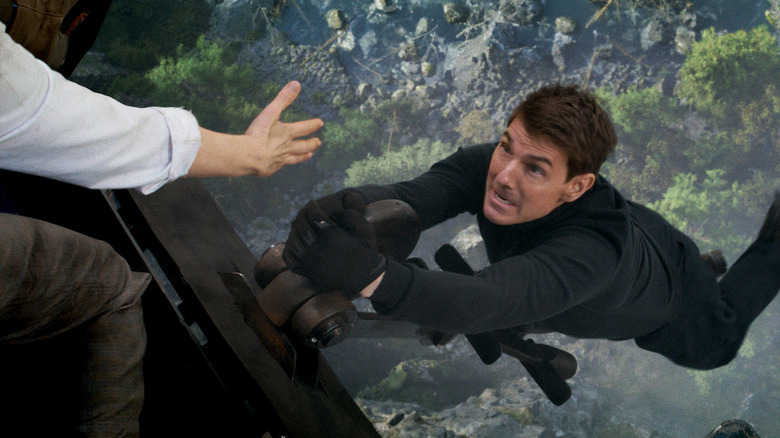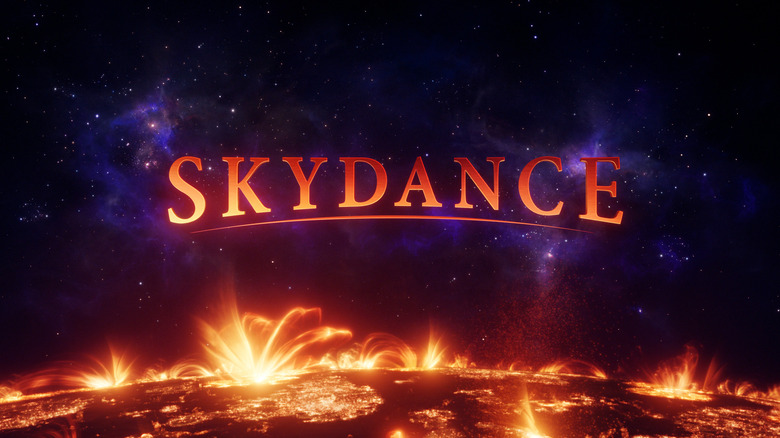The Paramount Merger Is Finally Official - And It Could Have Been So Much Worse
It's finally official. After months of discussions, speculation, and close calls, Paramount has agreed to a merger with Skydance. Paramount is one of the oldest studios in Hollywood and Skydance is a major production company with close ties to the studio, having worked with it on the "Mission: Impossible" and "Terminator" franchises, among many other projects. The Paramount/Skydance merger originally looked like it was going to happen last month before the rug got pulled out. Now, the two companies have come back together to hopefully forge a more secure future in a rapidly changing entertainment business landscape.
Paramount's special committee has now unanimously approved the merger. Skydance and RedBird Capital partnered on the deal, which had to be signed off on by Paramount's controlling shareholder Shari Redstone. She owns National Amusements, which controls the majority stake of Paramount. So, what did they finally agree to, exactly? Let's get into the nitty-gritty of it all.
Per a press release, Skydance will merge with Paramount in an all-stock transaction valuing Skydance at $4.75 billion. Skydance stakeholders will receive 317 million shares of stock valued at $15 per share. Skydance and RedBird will invest $2.4 billion to acquire National Amusements for cash as well as $4.5 billion for the stock/cash merger. It will also pay $1.5 billion, which will be added to Paramount's balance sheet. That means the deal is valued at roughly $8.4 billion or just a little less than the $8.5 billion Amazon paid to acquire MGM in 2022.
The only hitch here is that Paramount has a 45-day "go-shop" period, which means that other suitors can come forward with a better offer. But it more or less looks like this is going to happen, given how hard it was to get the deal done. While there are certainly going to be downsides including layoffs and likely cost-cutting measures, this is probably a best-case scenario for the moviegoers and TV lovers of the world.
How will the Paramount/Skydance merger work?
This is all subject to regulatory approval and other such hurdles. Disney, for example, had to jump through quite a few hoops before its $71.3 billion acquisition of Fox was finally completed in March 2019. That was a much bigger and radically different situation though. Two studios were coming together, essentially taking a major Hollywood player off the board. In this case, a production company is merging with an existing studio. That's not to say there won't be hurdles, but it likely won't face quite as much scrutiny from regulatory bodies.
The new leadership team will be headed up by currency Skydance CEO David Ellison as Chairman and Chief Executive Officer, and Jeff Shell as President. This new team plans "to enhance and reinvigorate marquee Paramount and CBS brands," per the press release. They also say that the new Paramount "will be a creative-driven destination for storytellers dedicated to delivering top-quality content." Ellison had this to add:
"This is a defining and transformative time for our industry and the storytellers, content creators and financial stakeholders who are invested in the Paramount legacy and the longevity of the entertainment economy. I am incredibly grateful to Shari Redstone and her family who have agreed to entrust us with the opportunity to lead Paramount. We are committed to energizing the business and bolstering Paramount with contemporary technology, new leadership and a creative discipline that aims to enrich generations to come."
Skydance brings to the table franchises and hit films including but not limited to "World War Z," the recent "Star Trek" films," "6 Underground," "The Tomorrow War," "The Adam Project," and "Top Gun: Maverick," as well as the "Mission: Impossible" franchise. Many of those were collaborations with Paramount. On the other side, Paramount brings a movie studio, CBS, Nickelodeon, BET, Showtime, MTV, the free-to-watch live streaming service Pluto TV, and Parmaount+, among other assets. Some assets, such as BET, are almost certainly going to be sold to help shore up the core business.
What could have happened to Paramount instead?
As mentioned, there are going to be downsides here. Jobs are going to be lost at both Paramount and Skydance to reduce redundancies and reduce costs. It's impossible to know what changes will come, but not all of them will be good. That's just how these things go. That having been said, this is the best-case scenario, given what was on the table. Sony, for example, put in a bid to buy Paramount back in May. Had that happened, there would have only been four major studios left in Hollywood, including Disney, Warner Bros., and Universal.
Speaking of Warner Bros. Discovery, it also had talks with Paramount late last year, but fortunately those talks fell through pretty quickly. Given how messy the merger between Discovery and WarnerMedia has been, one can only imagine how disastrous that could have gotten. This to say, a production company that already had close ties to Paramount winning out here seems to serve viewers better than taking another major studio off the board. Less competition is a bad thing, particularly as uncertainty at the box office looms and the streaming wars rage on.
To that end, there is a lot of uncertainty about the future of the business. We know streaming is the future, but how is everyone going to make it profitable? What happens as cable TV slowly begins to die? How will companies like Paramount continue to navigate changing habits of moviegoers? What happens when one or more of the major streaming services out there closes up shop? These are big questions and, prior to this merger, Paramount was not in great shape to weather the storm on its own. With their powers combined, Skydance and Paramount are better positioned to carve out a future in the business.


